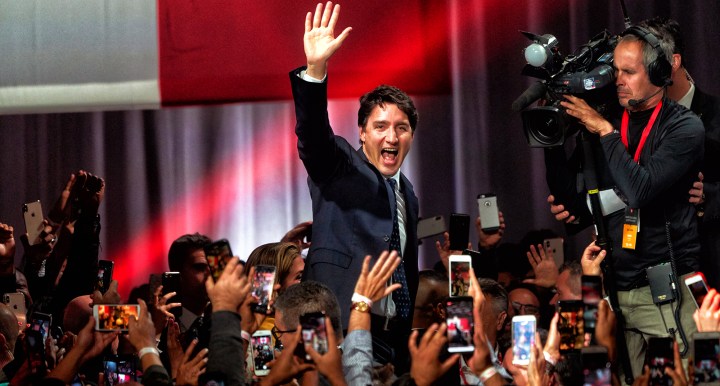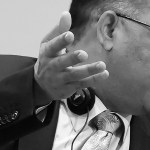OP-ED
How Trudeau lived to fight another day (and why Canada’s election really mattered)

An old picture of Trudeau wearing blackface surfaced during the election campaign. Then another, plus a grainy video. That no one from his past accused him of being racist offered small comfort. One of democracy’s most potent political brands was unravelling in an international media frenzy.
Just days before Canada’s national election on 21 October, polls suggested that its ruling Liberal Party might be defeated by the main opposition party. The Liberals’ leader, Justin Trudeau, a global icon for progressive politics since being swept into power at just 43, was scrambling. His charmless opponent, Andrew Scheer — a social and economic conservative — smelt victory. Canada was poised to be boring, again.
For his first three years in power, Trudeau had it all his way. Dreamy and gregarious, social media experts dubbed him the first prime minister of the Instagram Age. He was popular at home and adored abroad. Few if any democratic leaders had enjoyed so long a political honeymoon.
Comparisons with Trump helped. Trudeau’s star may have dimmed sooner with a less odious neighbour in the White House. But his mass appeal had depth. It was sustained by the idealised version of Canada — just, stable, diverse, inclusive, reconciliatory, feminist — he embodied and championed.
Against the waves of populism crashing into the democratic world, the image of Canada as a beachhead of progressivism and tolerance went global. Europe sent ships to turn away migrants, Canada opened its doors to them. America waged war on drugs, Canada legalised cannabis.
Lost in all the fever around Trudeau: Canada wasn’t getting kinder inasmuch as the world around it was getting nastier.
Reality bit Trudeau gently at first, then nearly devoured him. His efforts to thwart a criminal prosecution of a giant engineering firm accused of bribing foreign officials backfired when his attorney-general resisted. She was later sacked along with a cabinet ally. Trudeau claimed thousands of jobs were at risk if the trial went ahead. His argument vanished in the optics: both ministers were women, one also First Nations (indigenous).
Worse followed. An old picture of Trudeau wearing blackface surfaced during the election campaign. Then another, plus a grainy video. That no one from his past accused him of being racist offered small comfort. One of democracy’s most potent political brands was unravelling in an international media frenzy. Canada’s reputation also was in the firing line.
On election day, about two-thirds of voters supported broadly social-democratic/left-of-centre parties, a result consistent with Canadian voting patterns over the past 30 years. The biggest of these, the Liberals — long known as the country’s “natural governing party” — won a narrow victory to form a minority government with 36 more seats than the right-of-centre Conservatives, who edged them in the popular vote overall. (In Canada’s first-past-the-post parliamentary system, many candidates win their seats with less than 50% of the vote.)
Bruised and chastened, Trudeau hung on as Canada’s prime minister. Many had already penned his political obituary. The result for them was a damp squib. In other ways, it was anything but. The perception of Canada as a beacon for our uneasy times was strengthened by last week’s election. Hopefully for the better.
Four issues stood out:
Climate
In 2018 the Canadian government enacted the federal Greenhouse Gas Pollution Pricing Act (GHGPPA) — a carbon tax. A levy on carbon has been a tough sell, if not political suicide, in countries such as Canada which are heavily reliant on natural resources. Take Australia. Voters brutally ousted its government in 2013 amid opposition cries to “axe the tax” on greenhouse emissions introduced a year earlier.
Trudeau promised a national carbon tax during his successful election bid in 2015. Four years later, he doubled down. He not only promised bolder steps to tackle climate change, he made them a central plank of his re-election platform. The opposition Conservatives had no plan for the environment and vowed to roll back the “job-killing” carbon tax. They misread the national mood.
Nearly two-thirds of voters chose parties with climate policies as or more aggressive than the Liberals’. Not for nothing did many declare planet Earth to be the real winner last week.
Trudeau’s goal of carbon-neutrality by 2050 will require some deft balancing in the short term. His commitment to expand a pipeline project — bringing oil from the tar sands of northern Alberta to ports in Vancouver for export abroad — is backed by Conservatives but bitterly opposed by the smaller parties. The Liberals will need their co-operation to get bills passed. Trudeau’s assurance that all pipeline profits will be reinvested in the environment might help win them over.
It is said that most elections are fought on economic issues. Canadians’ willingness to pay a price to save the environment presents a different future. If candidates for high office in other democracies start shouting “it’s the climate, stupid!” we’ll know it has arrived.
Populism
Into the vacuum created by Trudeau’s waning popularity and a general disaffection with Canada’s political class, there was plenty of space for populism to make inroads this election. For years, analysts have predicted that it’s only a matter of time. The ingredients are there.
Canada has been getting less and less white for a while. The multiculturalism so passionately advanced by Pierre Trudeau, prime minister during the first 13 years of his son Justin’s life, is now part of the country’s DNA.
Not everyone wants more new arrivals. One pre-election poll found that two-thirds of Canadians think immigration should be limited. And politics in the provinces has hardened. Religious symbols such as Muslim headscarves were officially banned in Quebec earlier this year. The noisy premier of Ontario has waged war — mostly in his own mind — against an ever-nebulous elite.
In steps the newly formed People’s Party of Canada (PPC) and its leader Maxime Bernier. His populist cant was Bolsonaro-lite — not quite as bigoted, nationalist, regressive and denialist as the “Trump of the Tropics” — but populist nonetheless. The New York Times predicted that Bernier would offer a “Far Right jolt to the Canadian election”. If he did, few felt it.
The PPC got less than 2% of the overall vote and failed to win a single seat. Bernier had been a Conservative member of parliament for the past dozen years in a seat held by his father for the same number of years before him. Losing it was no mean feat.
One of the many flawed assumptions that inspired his decision to form the PPC was that Canadians hadn’t noticed how little populist politics in Europe and elsewhere had delivered the past few years. His former party certainly had. The Conservatives pushed economic arguments or ideological ones and rejected divisive rhetoric. Had they tacked to PPC positions, they’d have lost votes.
None of this is to say that Canada’s politicians won’t reach into the populist playbook in the future or that Bernier is a completely spent force. But the populists’ showing was so dismal that one can’t help speculating that their time might be passing. And not just in Canada.
Nationhood
Reminders can be annoying. Especially of things we fool ourselves into believing have disappeared or been resolved. Canadians got that sinking feeling last week. Once again voters sent a clear message about the state of nationhood: Canada is a work-in-progress.
Non-Canadians are often bemused to hear that so constant and inoffensive a country as Canada came within a hair’s breadth of splitting apart a quarter of a century ago. Or that so much government energy goes into managing its linguistic and geographic differences. This election exposed nothing new. But the results suggest that such divisions have not been as stark for some time.
After being in the political doldrums for a decade, the separatist Bloc Québécois (BQ) party got more votes than the Liberals in Quebec. The BQ elected 32 members to the national parliament to protect the French-speaking province’s interests.
The Liberals were completely wiped out in Canada’s oil-producing heartlands, the western provinces of Alberta and Saskatchewan. Popular support for the Conservatives was high and political opposition to Trudeau’s carbon tax extreme. In the wake of the election a petition circulated in western Canada calling for separation from the rest of the country. As predictable as it was fatuous, the movement was dubbed “wexit”.
It won’t be easy for Ottawa to heal rifts with the provinces and ease regional tensions. These threats tend to ebb and flow in Canada. Some fault lines have always been there; others have appeared without warning. No one need tell Trudeau. His father faced down much worse during his time in office.
This election was a warning to Canadians that nation-building is far from over. It should also remind them that, collectively, they have managed their country’s divisions better than most. I can think of a few states — not least the former colonial master — which might benefit from watching what Trudeau does next.
Trudeau (and Obama’s shadow)
Tactical voting is common in first-past-the-post systems. You tick the box not for the candidate you most like, but for the one best placed to defeat the candidate you most dislike. Which is to say, animus towards the Conservatives played a much greater part in the Liberals’ win than voters’ (fading) affection for Trudeau.
He is better for it. The prime minister can now stop worrying about maintaining an image too lofty and emotive for any leader to bear. Knowing he’s not liked by a big chunk of the population might actually help Trudeau get more things done.
After a certain point in a democratic leader’s time in office, their likeability almost always wanes the longer they remain in power. The blackface crisis stripped all the polish off the Trudeau brand. But in exposing him, the scandal also humanised him. As humiliating as the episode must have been, he apologised, listened and learnt in a way few politicians seem capable of today. That might work in his favour during his second term.
Barack Obama came to Trudeau’s aid in the days before the election in an unusually strong show of support from a former US President. Obama is that rarest of leaders whose personal likeability appears not to have waned from his first day in office through to his last eight years later. Grace was the hallmark of the Obama White House. The time he wore a tan suit to work is only half-jokingly referred to as the greatest scandal of his presidency.
One wonders if Obama could have accomplished more had the mask slipped early on. His burden to not make mistakes was heavier than his predecessors’, to be sure. But if he’d embarrassed himself once or twice, image might have mattered less. By the end of his elegant tenure, it became impossible to imagine Obama bulldozing political opponents.
Sometimes that’s what it takes. Part of the reason Lyndon Johnson proved so effective in driving domestic reforms when he was president in the 1960s is that he never tried to conceal his boorishness. Instead he used it to his advantage.
Trudeau is no LBJ. But the past few months have proved he’s no Obama either. All the scars he’s collected could be good for him. And Canada too. We’ll have to wait and see. DM
Dr Terence McNamee is a global fellow of the Wilson Centre (Washington DC), based in Johannesburg. He is co-editor of the centre’s forthcoming book on peace-building in Africa.

















 Become an Insider
Become an Insider